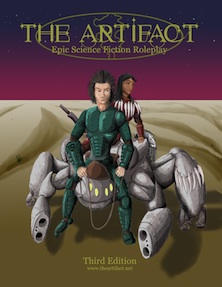You’d think I’d just say what is true and not true about a game I wrote. It is the game I wanted it to be but it’s also something else. Sure I set certain things down in writing twenty two years ago but in the mean time, those things have informed me of their implications. That has been the biggest adventure of all in playing the game, listening to what the game wanted to be.
So what is The Artifact? I wrote it so that players would not just tell a story of characters, rather that they would experience what life would be like in this world through the experiences of the characters. It was written to be encompassing of what a person could encounter. For a very long time, it seemed like it couldn’t be defined in an elevator pitch.
After playing the game for so long with many different people, I think the experience of the game has told me what it’s theme is. My official version is this.
The Artifact is a game about adventurous lives on an alien world as earth slowly loses it’s grip on you.
In a way, The Artifact very similar to growing up. You start out dependent, for good or bad make relationships with the people that foster you and slowly become more and more independent. You eventually make your own way, maybe chasing after goals, maybe making your own community.
Thinking about that, we’ve had plenty of aborted campaigns that never felt right and I think it’s because they didn’t fit that theme. That tells me that there is a “right” kind of campaign for The Artifact and it goes like this.
A successful campaign starts out with the players very dependent on their community. Maybe this is a military unit, maybe it’s a Scimrahn tribe. The players should get to know their “family.”
It’s very important at this stage of the game to emphasize that the players are defending their family. They may serve a major or minor role in this but it’s the bedrock of The Artifact experience.
At some point the characters have to become independent. Here, there are options. Maybe they strike out on their own willingly after a goal like seeking treasure. More often than not, they are shaken from their family by tragedy. The community they’ve fought to protect is torn away from them by powerful forces.
After stabilizing themselves with no one to help them, they carve out a niche for themselves, maybe mixing with new communities but not really setting down roots.
Now the players set out after their goals through the characters. Maybe they seek revenge on the forces that tore them away from their community. Maybe they establish their own place, fortified from detection or attack.
These stages don’t have to be very long but they tend to become longer as the games go on. For example, losing the character’s family is often quite short, only lasting 2-5 games. The wandering phase can be much longer where the characters become more competent and capable.
The end phase tends to be brief, by this time the players feel like they’ve accomplished what the characters are reasonably going to do.
Our longest running campaign was a mash up of characters leapfrogging over each other so it didn’t quite follow this pattern but some of the characters did. It’s important to know that even in the fist phase the characters can go out on their own and return to their community again and again before they’re finally forced to leave. There are plenty of distracting side paths that the players can explore that won’t relate to this theme either and that’s fine.
I’m going to try more or less following this pattern and see how it effects our games.


 The Free RPG Blog
The Free RPG Blog